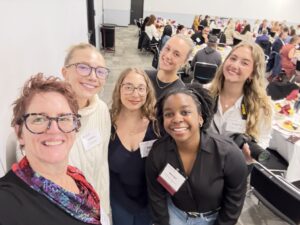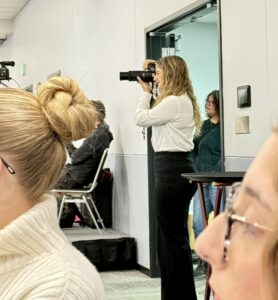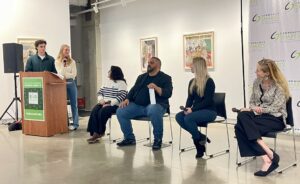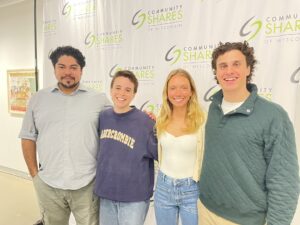 In Fall 2024, Madison Commons launched a new initiative to explore solutions to our persistent and noxious societal problems in an era of declining resources and support from government and other institutions. The idea was to invent a new kind of journalism, one in which reporters operate as caregivers and content highlights paths forward. We nurtured a series of partnerships with local nonprofits working to ameliorate these problems in hyperlocal spaces, such as with the UW Odyssey Project that transitions low-income adult students interested in seeking higher degrees.
In Fall 2024, Madison Commons launched a new initiative to explore solutions to our persistent and noxious societal problems in an era of declining resources and support from government and other institutions. The idea was to invent a new kind of journalism, one in which reporters operate as caregivers and content highlights paths forward. We nurtured a series of partnerships with local nonprofits working to ameliorate these problems in hyperlocal spaces, such as with the UW Odyssey Project that transitions low-income adult students interested in seeking higher degrees.
We began our “Community Collaborations” site in Fall 2024 with a focus on housing insecurity, offering resources, stories, a documentary, personal essays and other content. Then we got a grant from the Solutions Journalism Network as part of their Student Media Challenge to explore youth mental health, so we wanted to hone in on the intersection of housing insecurity with youth mental health. The Student Media Challenge is a program that supports college newsrooms in producing “solutions journalism” reporting on how communities are addressing social problems. Since launching in 2022, it has grown into a year-long project where student publications are selected into a cohort, receive training, and a grant ($7,500) to pursue in-depth projects, especially on topics like youth mental health. Participating colleges come from a wide range of schools. Through the Challenge, student journalists gain hands-on experience in reporting solutions; they explore real responses, evaluate their effectiveness, and tell stories that build public understanding and inspire change.
As part of this program, for 2025-2026, we established Team Home and Mind, or for short, Team HAM. In the fall of 2025, this group comprised 10 UW-Madison students who investigated the troubling crisis of housing insecurity in Dane County, Wis. and how that specifically affects youth and adult mental health in the community. Team HAM focused efforts on reporting through solutions and collaborative storytelling, thus amplifying the voices of the people being interviewed and their stories while simultaneously cultivating a story on how to help and further provide support to the issues being reported on.
Background on Housing and Youth Mental Health
Madison’s housing, both for renting and buying, is considered fairly expensive compared to other U.S. cities. Average renting costs are about $1,469 a month for 712 square feet, putting the city at position 31 out of 100 most expensive places to rent in the United States, according to a Zumper National Rent Report. This is compared to $1,623 a month as the national average for renting apartments the same size. Buying a house is out of a lot of people’s reach in Madison, with the median home price hovering around $407,621 and increasing dramatically – about 5.1% in 2024 – each year, according to Zillow statistics. As one example, the average house cost about $250,000 in 2017. For people living paycheck to paycheck, these numbers become stark realities each month as they are forced to make choices: broccoli or meat? Eating three meals a day or two? Pay the water bill or the rent? We wanted to dive deep into these dilemmas and find the programs and opportunities to ameliorate these choices.
But with the SJN grant, we wanted to expand our focus to consider the impact of these housing struggles might be on people’s mental health, especially for young people. So we were looking at those struggling with mental health who are 18-21-year-old UW-Madison enrolled students or young adults who would love to go to college but have trouble affording a place to live in an expensive housing market. These students and young adults contend with spotty histories of renting because of their mental health.
We know that students who do make it to campus experience much higher levels of depression and anxiety when they find themselves falling behind on rent. One 2022 study in the Journal of Community Health found that 44% of college students responding to a survey “were housing insecure in the past year” and that “basic needs insecurities significantly increased odds of anxiety (FI aOR = 4.35, HI aOR = 3.43) [and] depression (FI aOR = 3.18, HI aOR = 3.16).” K-12 kids whose families struggle with consistent, safe shelter and who often fall through the cracks in terms of their mental health needs. For example, kids who have accommodations but have to move every six months because of housing insecurity receive spotty treatment and learning. What are the intersections between housing insecurity and youth mental health and how might we ameliorate the problem with this population?
This will be a series of projects to investigate possible solutions to these kinds of noxious problems such as housing insecurity and youth mental health concerns. Future teams might expand these topics to issues like addiction, health care costs or poverty. In an era of diminishing government support and institutional safety nets, what programs exist and what ones could be created? How might we journalists advance the conversations and point toward solutions for Madison communities? We see our role as connecting people with resources and creating a network of experts and policymakers and organizations at the forefront of this issue through a combination of content production and events.
2025-2026 Team Home & Mind
The 2025-2026 team consisted of reporting interns, Laine Casey, Amari Mbongwo, Mackenzie Belletini, Amelia Geis, and Katie Mastorides. Film and photography interns, Sophia Capolupo and Lucas Snow, and editorial intern, Sara Babani, as well as the Madison Commons legal studies intern Maddie Green and the Madison Commons managing editor intern Alex Malatesta. This is all led by Madison Commons Publisher Sue Robinson with support from MC Editor Stacy Forster and MC Managing Editor Louisa Kamps. In Spring 2026, this editing team was joined by Carlos Dávalos, a PhD student and working journalist. 
For 2025-2026, we collaborated with the following nonprofits: UW Odyssey Project, The Road Home, Movin’ Out, Bayview Community Foundation, Root2Rise, GSafe, and the podcast Housing Last.
List of content from Team Home & Mind
2024-2025 Team Housing
The SJMC seniors Maeghan Chase, who served as our managing editorial intern, and Noah Maze, who served as our legal studies intern, led this effort. They came up with the topic and worked throughout the year, not only on developing resource lists and helping to find funding, but also helping to form a reporting team for the Spring 2025 semester and hosting two events. Our team included: Lily Spanbauer, Maneeya Leung, Alyssa Lutker, Sreejita Patra, Kiesen Williams and Maggie Cleary. This is all led by Madison Commons Publisher Sue Robinson with support from MC Editor Stacy Forster and MC Managing Editor Louisa Kamps. 
We collaborated with five organizations that are all working toward possible solutions to the vexing issue of housing insecurity: the UW Odyssey Project, OWN IT: Building Black Wealth, FLYY, the disbanded podcast with WORT host Matvei Mozhaev and the City of Madison’s Community Development Authority Housing Operations Division. In this collection you will find a list of resources for people struggling with housing costs or tenant rights, wrongful eviction and other concerns, stories and photos of our two April 2025 events, profiles of people working on the front lines in various organizations, vignettes of people struggling with housing and finding solutions, podcasts of unhoused people and other content.
 List of content from Madison Commons’ Team Housing:
List of content from Madison Commons’ Team Housing:
- Resource: Housing organizations and programs (Noah Maze, Spring 2025)
- Resource: Dane County housing consortium as a resource (Alyssa Lutker, Spring 2025)
- Solution Story: OWN IT: Building Black Wealth profile (Maneeya Leung, Spring 2025)
- Resource: Ten Tips for for tenants from Wisconsin lawyers (Lily Spanbauer with photos by Jonás Tijerino, Spring 2025)
- Solutions Story: Exploring a "Family Scholar House" for Madison (Alyssa Lutker, Spring 2025)
- Understanding the struggle with housing: UW Odyssey Project students share their housing struggles (Maggie Cleary, Spring 2025)</a?
- Solutions Story: Explore the Scholar House concept (Kentucky and Indiana) (Sreejita Patra and Kiesen Williams, Spring 2025)
- Solutions Story: The UW Odyssey Project residential learning program (Sreejita Patra, Spring 2025)
- Understanding the struggle with housing: What we can learn from urban renewal
(Lily Spanbauer, Spring 2025) - Profile: Meet Team Housing partner Brian Bedford (Sreejita Patra, Spring 2025)
- Solutions Story: Wisconsin lawmakers take aim at AI pricing in rental housing, joining national antitrust fight (Noah Maze, Spring 2025)
Signed,
Sue Robinson
Madison Commons Publisher

